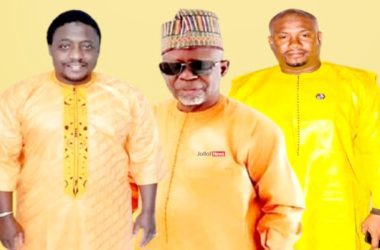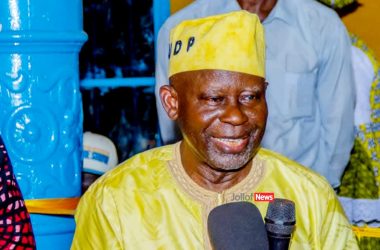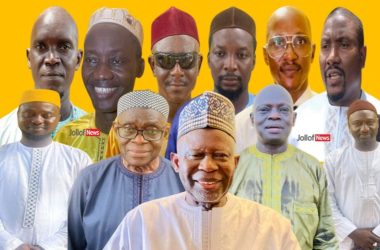By Yahya Dampha
The United Nations Human Right Council’s Universal Periodic Review has just come to an end, and, like the rest of the countries whose human rights situations were under review, the Gambia had its chance to defend itself.
Jollof News’ Yahya Dampha was in Geneva to witness it all happened. He saw how the rest of the world views the Gambia, and how they responded to the report submitted by the Gambian delegation in defence of its government’s stance against not only the independent press but also all other opponents of the prevailing system.
The Human rights situation of the Gambia was the subject of heated discussions at the just concluded Universal Periodic Review at the UN building in Geneva. Over the years this small country appears to have earned itself a rather controversial reputation. Although to many Gambians who identify themselves with the country’s oppressed class their plight appear to have gone largely unnoticed by the outside world, the atmosphere in Geneva over the last few days suggested differently altogether.
After Gambia’s Justice Minister’s submission of the country report, Mrs Marie Saine Firdaus was most likely astounded by the overwhelming reactions that emanated from the international community, with countries demanding that the Gambia works on improving its human rights situations. But in way, it wasn’t totally a surprise given the overwhelming attention human rights groups across the continent had garnered prior to the Geneva meeting by appealing to regional giants for action against the Gambia government.
Apart from its lame excuses for its attack on the independent press, the Gambian delegation endeavored to free itself from the responsibilities of so many anomalies it presided over within the last one and a half decade. The prevailing oppressive political situation was also a popular subject among the international community. The continuous detention of political prisoner Kanyiba Kanyi, a member of the main opposition grouping in Gambia, the United Democratic Party (UDP), and Journalist Chief Ebrima Manneh, especially featured well in the questions by the world delegates for the Gambian government.
The Gambian government, through its head of delegation, Justice Minister Firdaus, informed world delegates that the missing UDP stalwart was never arrested by the state. She said that in her capacity as Justice Minister, she embarked on an unannounced visit to all the country’s prisons, accompanied by the United Democratic Party leader, Lawyer Ousainou Darboe, and the minority leader in the National Assembly, a UDP member, Alhagie Momodou Sanneh. She claimed that both leaders could confirm the detainee wasn’t under state custody. The minister however would not tell the world what more efforts the government did to locate the missing man, whose family strongly believe that he is in state custody, and none else.
Justice Minister Firdaus also did not say if she had made any contact with Kanyiba’s family so as to ascertain when they last saw him, which many believe is were any tangible investigator should starts from.
When contacted by Jollof News, Minority Leader Momodou Sanneh confirmed that both himself and his party leader, Lawyer Ousainou Darboe, had indeed gone on a search mission with the Justice Minister to the Mile II prison. He was however quick to add that they only stopped at Mile II and not any other prison or the many secrete detention facilities human rights groups have alleged are embedded across the country.
Asked by this reporter if they had private talks with inmates at Mile II, who may likely have set eye on Kanyiba, if he ever was taken there in the first place, Honorable Sanneh referred him to his party leader. He added that they had planned to go to other detention centers but that in between he traveled to Nigeria, and so he would not know if the UDP leader, Lawyer Darboe and the Justice Minister might have concluded the search mission.
Our efforts to reach the UDP leader proved futile as he was not picking his phone after repeated calls.
On the on going trial of Femi Peters, Justice Minster Firdaus argued that the accused flouted a lawful order not to hold a political rally on that day and at that particular place. She said the UDP was denied permit to hold a meeting because President Yahya Jammeh was supposed to be traveling on that same route at the same time that the opposition party was supposed to hold their meeting. She said Peters failed to respect the laws of the country by going ahead with his planned meeting.
The head of the Gambian delegation failed to make any comment on the whereabouts of missing journalist Chief Ebrima Manneh, whose case have since been the subject of UN interest.
International reactions
The first country to lambast Gambia’s rights situation was Brazil; and then the central Asian nation of Kazakhstan. Ironically, even Pakistan did.
The Brazilian delegates condemned reports of enforced disappearances, torture and the country’s clamp down on the media. They also called on the Gambia government to abolish the death penalty and to do away with the highly repulsive anti media laws. Brazil also wants Gambia to raise the age of criminal liability, among others.
The Kazakh delegation pointed to the unhealthiness in the Gambia’s act of ‘‘terrorizing’’ its media. The faith of the Gambian media was also the focus of the Pakistani delegation, which urged the country to endeavor to abolish all unhealthy media laws and adhere to its international human rights obligations.
Similar and perhaps even more condemnatory reactions to Gambia’s country report came from Hungary, France, Germany, Britain, Sweden, Canada, The Netherlands, the US, among others. The Hungarians particularly found unconvincing the Gambia government’s claim that the country’s media was engaged in irresponsible journalism with the goal of getting political asylum overseas. The Netherlands, among other things, recommended that Gambia establishes a national human rights commission.
While calling on Gambia government to allow divergent views, press freedom and to intensify its fight against human trafficking, the Canadians condemned the arrest and prosecution of the United Democratic Party’s campaign manager, Femi Peters, among various other repressive acts by the Jammeh administration which are directed at dissenting voices.
France and the United Kingdom both condemned the lack of political and press freedom in the Gambia. They also called on the Gambian authorities to establish a national human rights commission.
Even delegates from Africa, many if not all of whose countries need a thorough look at their human rights situations, themselves, (Togo, Ghana, Egypt, Angola, Algeria, Ivory Coast), had their own advice for the Gambian government regarding its stance against the press in particular. The Senegalese government though, which appear to have found a new friend in an old foe, neglected calls by human rights organizations back home in Dakar to reign in on the Gambian government. Senegal turned out to be the main advocate for the Gambian government.
Belarus, Spain, India, Australia, Switzerland and Nicaragua, all appear to view Gambia as incondusive for journalists, calling on it to change its stance.
Trending :
- 11 hours ago
- GPA Staff Sent Home Over Multi-Million Dalasi Financial Scandal But…
- 11 hours ago
- Gambia Gov’t Puts Finishing Touches To Gamtel/Gamcel Privatisation Project
- 11 hours ago
- Story Of Clothes Dearth At Mile II Galvanizes SK Jaiteh Into Donating To Inmates
- 13 hours ago
- Cement Importers Association Petitions Gambian Authorities
- 19 hours ago
- Ex-UDP UK Secretary Darboe Dismisses Fears Of Bensouda Repeating Barrow’s ‘Betrayal’




